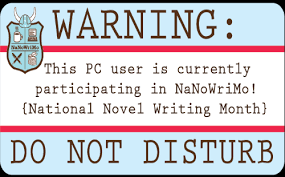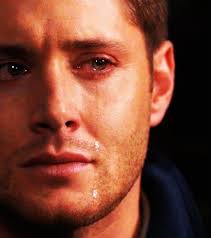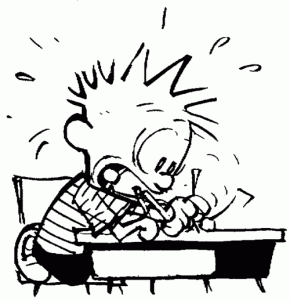I’m an NaNoWriMo widower… at least to an extent.
If you’re not familiar with NaNoWriMo—or can’t remember when I’ve talked about it before (I sympathize, believe me)—NaNoWriMo is internetspeak for National Novel Writing Month, and you can find out more about it at nanowrimo.org. The simple definition is this: you write 50,000 words in a month. The aim is to write a short, completed novel, though some begin early and use that crunch to finish—or at least get close to finishing—a novel. It happens every November. The idea behind this is to get the story down on paper. Don’t edit. Don’t polish. Just write. What my wife calls word vomit.
Yes, we’re back to my wife again.
See, I got married in July to the woman I’ve spent my life looking for. Less than four months later, she’s writing a cozy mystery for NaNoWriMo. In and of itself, I love the idea, and I’m fully supportive. But as I write this, it’s November 7th, and I miss her already.
See, to achieve this goal, she has to write an average of 1,667 words a day (50,000 ÷ 30 = 1,666.66667, for you math nerds), and she has to do this in the evenings after she gets home from her day job (you know, that nasty thing we writers have to have to do things like eat food). And that means she has very little time to spend with… me.
I know: cry me a river.
Though this post is largely tongue-in-cheek, I have to be honest and reiterate that I support her fully. Way back when we reconnected (my wife and I once knew one another more years ago than I care to talk about), during the catch-up stage, I told her I was a writer and had four books published. She admitted that had been a dream of hers all her life.
See how we’re so well-matched?
But here’s the thing: she saw my writing, and that of the people I associate with, and I think it intimidated her. After that initial mention of wanting to be a writer, she didn’t bring it up again.
And that bothered me.
See, I’d read some of her Facebook posts. And thesis papers. And I knew she could write, if she’d just give herself permission to. But I had trouble convincing her of that.
I stayed patient, though, not because I’m a saint, but because every writer in history has been there: we want to write, but have no confidence in our abilities to do so. We want to be (insert name of favorite author here) right off the bat without going through whatever (favorite author) went through to get that good. It’s normal, and very human, and it’s not limited to writers and would-be writers. I’d guess every creative person is that way.
What separates the wheat from the chaff—or elevates a would-be to a writer—is the discipline to put butt in chair and write. You gotta have your chops, and while meditation is a good thing, it will never totally replace action, especially when it comes to being creative. At a certain point you simply have to do something about your dreams, rather than just dreaming them.
My wife loves cozy mysteries, and she came up with an idea for one (I refuse to share it here until she’s done with it) that I think is excellent, and it draws on her own experience, which will make it more authentic. She’s let me read most of it as she finishes each section, with the caveat that I turn my editing off, and it’s excellent, especially for someone who said she couldn’t write. I’m not much on cozies, but I know good writing when I see it, and she’s got it.
I encouraged her, so I guess I’m getting my just desserts.
But you know what? That’s okay. It’s made her happier than I’ve seen her yet, and she loves that I believe in her, and that makes it worth anything I could go through. After all, she sits in bed to write while I’m reading (how’s that for a hot time in the bedroom?), so we’re still spending time together, and it doesn’t get much better than that.
Only twenty-three more days to go…
Later,
Gil




